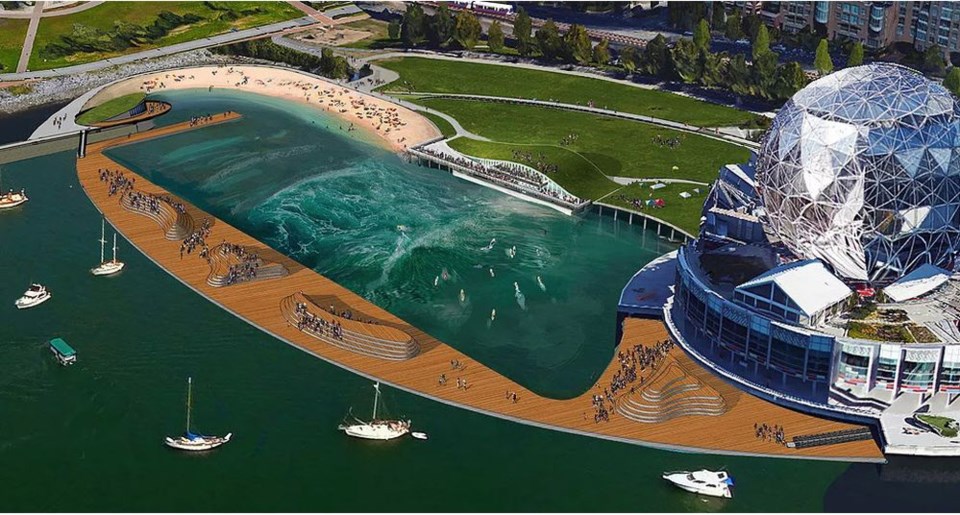Call it a case study in making waves, albeit waves that were seemingly clear as mud.
A Vancouver-based firm called Reviver Sport+Entertainment unveiled a flashy new website Tuesday complete with plans for a “surf park” adjacent to Science World in northeast False Creek.
The proposal includes plans for a 200 by 100 metre pool and accompanying infrastructure — retail and operational — along with a host of other features: a continuous swimming route linking the pool to False Creek, a geothermal heating system that would clean and filter the polluted ocean water and potential partnerships with Telus Science World or the Vancouver Aquarium to provide ancillary learning services.
Company CEO Philip Davis conceded the website and information bonanza Tuesday was part of a carefully-crafted plan to make a splash ahead of more substantive talks in the future.
“We’re in a very conceptual stage at this point,” Davis told the Courier Tuesday. “What’s important to remember is that at this stage, what we really want to do is to get the concept out there.”
And get that concept out there, he did. Media outlets across Metro Vancouver ran with the info posted on the company’s website verbatim with little context, timelines, associated costs or comment from the Vancouver Park Board.
Admittedly, Davis was lean on specifics when he spoke to the Courier: he didn’t provide a fully-costed plan, how much user fees would be or a complete vision for any associated services.
Options that he and partner Colin Weston have tossed around could include a restaurant or café, open public spaces, a boardwalk and even a marine interpretive centre.
“We’re not looking at this being funded by government,” he said. “This is a privately-funded effort and for that reason we would look at it as being for resident use and as a tourism asset. We’re not looking to the taxpayer.”
Davis would like to have the facility open by 2019, one year ahead of surfing’s inclusion in the Olympics for the first time. An ex-pat Aussie who moved to Vancouver in 1998, Davis wants the culture of surfing more deeply embedded on the West Coast and suggests the facility could be open year round.
“One of the things that struck me [when I moved to Vancouver] is that I basically had to drop surfing and take up snow sports, because of Vancouver’s geography,” he said. “I believe that surf culture is an immensely rewarding thing for the whole family.”
Vancouver Park Board chair Sarah Kirby-Yung noted that Reviver Sport+Entertainment has had very preliminary talks with park board staff. She was careful about nixing the plan entirely in an interview Tuesday, though she had her reservations about how the proposal could monopolize that section of waterway for one group or use.
“I don’t know that this is the right idea in the right place for our city, but I welcome the dialogue,” she said. “This is a particularly challenging site in False Creek because there is a finite amount of space and there are a lot users in there right now.”
Compounding the issue is the site itself: part of it is currently tapped for new park land and a lengthy visioning process is being undertaken to determine future uses.
The water quality in False Creek is also a sticking point: long-standing high E. Coli counts in False Creek are such that residents are told not to ingest the water and shower after coming in contact with it.
There’s also a complex maze of bureaucracy to wade through: all three levels of government, Metro Vancouver and Vancouver Coastal Health would be involved in the conversation.
Davis doesn’t necessarily seem to think so, however. He suggests the land and surrounding water is designated as a “water lot,” one that’s leased by the province to the city. Access to the use of a portion of nearby parkland would need to be negotiated, he added.
“There’s no land acquisition, per se, required,” he said. “What we would be proposing would be something that is in unison with the city and with the park board.”
Not so much, according to Kirby-Yung.
“I suspect there may not be a full understanding there,” she said. “You’ve got a private company putting forward a very innovative idea because they want to make some waves and they’re doing that. I think perhaps they need to understand a bit more about the various jurisdictions and how this would need to work.”
As for the Reviver Sport+Entertainment brand, Davis said the company was founded in 2010 and is actively involved in the business of “sport overlay,” a concept he described as infrastructure planning for large sporting events. Both he and Weston are architects and designers by trade who are trying to tap into new demographics and trends in sport, a concept that’s fully illustrated in their idea for “Ripped Links.”
That idea aims to marry golf with action sports, set against the backdrop of a music festival.
“We see golf’s decline being because millennials are simply not playing the game,” Davis said. “So we see, with the emerging trends in actions sport and with lifestyle activities, that if we create a golf format that speaks more to that market in the way that they want to engage, not just to play but to watch, then we are meeting those trends.”
Davis did not provide timelines on when, or if, more meaningful discussions will take place with the city or park board.



